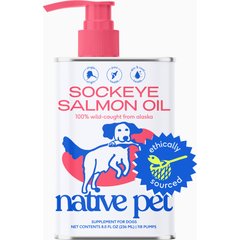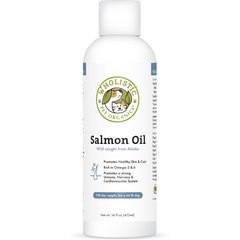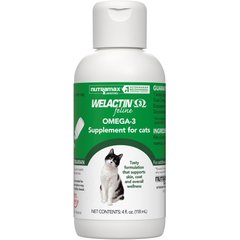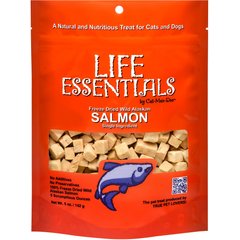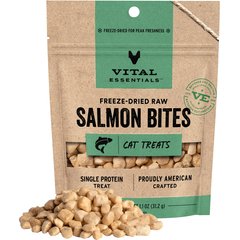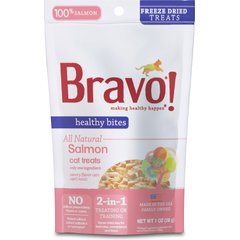What Is Salmon Oil for Cats?
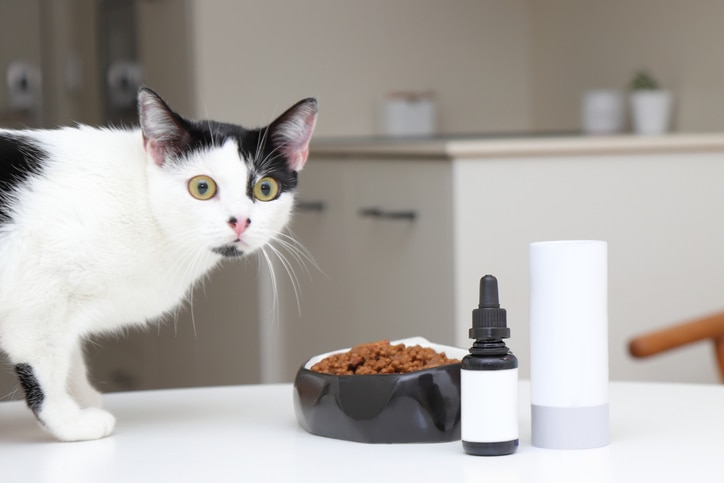
Photo by Olga Berezhna/iStock/Getty Images Plus
Shiny fur? Check. Heart-healthy fats? Sure thing! Relief for achy joints? The research says yes.
These are just a few of the benefits of salmon oil for cats. Packed with omega-3s and other key nutrients, fish oil is scientifically proven to support feline health, and salmon oil is often the superior choice.
Key Takeaways
- Salmon oil is rich in essential omega-3s that support cats’ heart, skin, joint, kidney, and brain health.
- Most healthy cats on complete and balanced diets don’t need supplements, but salmon oil may help with certain conditions.
- Always use vet-approved salmon oil products specifically formulated for cats.
- Too much salmon oil can cause digestive issues, weight gain, or other health risks, so consult with your cat’s veterinarian before offering a supplement.
What Is Salmon Oil?
Salmon oil is made from salmon, typically using parts of the fish like the head, skin, and bones. These byproducts make up about 40–50% of the fish and are still rich in nutrients.
Rather than going to waste, they’re turned into high-quality supplements and ingredients for pet foods, including salmon oil and salmon meal.
Salmon oil, in particular, contains important nutrients, like long-chain omega-3 polyunsaturated fatty acids, specifically eicosapentaenoic acid (EPA) and docosahexaenoic acid (DHA), says Eliza O’Callaghan, managing veterinarian for Small Door Veterinary’s practices in New York City.
Is Salmon Oil Good for Cats?
DHA and EPA aren’t just healthy; they’re also essential omega 3 fatty acids for cats. Felines don’t make enough on their own and must get them through their diet.
It’s important to feed a commercial cat food that’s complete and balanced and also formulated for your cat’s life stage. These diets include the right amounts of vitamins, minerals, proteins, and amino acids to keep your cat healthy.
Salmon isn’t the only oily fish in the sea that offers DHA and EPA. Still, Marc Smith, a veterinarian at Natchez Trace Veterinary Service in Nashville, says he often recommends salmon oil over other options, including cod liver oil and krill oil.
Dr. Smith says that along with EPA and DHA, the most beneficial omega-3 fatty acids for cats, salmon oil has a mild flavor and smell that make it more appealing to our pets.
Most healthy cats who eat a balanced diet won’t need extra supplements, but adding salmon oil—with your vet’s approval—can help support certain medical conditions.
Heart Health
Salmon oil can be good for a cat’s heart, Dr. Smith says. This is largely because salmon oil helps lower triglycerides, a type of fat in the blood.
He also notes that EPA and DHA in salmon oil may help regulate heart rhythms, support healthy circulation, and reduce blood vessel inflammation.
Skin and Coat Health
Cat dandruff isn’t uncommon, but adding salmon oil to your cat’s diet could make it a thing of the past. In fact, many pet parents see shinier fur, healthier skin, and fewer hairballs in as little as four to six weeks, Dr. Smith says.
Healthier skin also makes cats less likely to experience the inflammation and itchiness that sometimes accompany allergies.
Salmon oil can be especially helpful for:
- Cats with dry, flaky, or itchy skin
- Cats with dull or brittle coats
- Cats recovering from an illness
Joint Support
Salmon oil is an excellent addition to a joint-healthy diet. Its omega-3 fatty acids help block the compounds and chemical messengers that contribute to achy joints.
While the salmon oil is not a replacement for medication, studies show it can be helpful alongside it.
Kidney Health
Kidneys are critical to cats’ health because they filter toxins, balance fluids, and produce hormones that regulate blood pressure and red blood cells. Many senior cats develop chronic kidney disease, which damages the kidneys.
Omega-3s from salmon oil can be particularly beneficial because they may reduce inflammation, improve blood flow, and help the kidneys work more efficiently.
Research shows that cats with kidney disease who consume fish oils such as salmon oil have less protein in their urine.
Brain Health
DHA is important for kittens for healthy brain and eye development. Complete and balanced kitten foods already include DHA from ingredients such as fish oil, whole fish, or fish meal, so always check with your vet before adding extra to their diet.
Senior cats may also benefit from fish oil because it may also help keep their brain sharp.
Just like people, cats can experience cognitive decline as they age. Fish oil may help protect the brain by safeguarding it against harmful proteins that build up and damage brain cells.
What Is the Best Salmon Oil for Cats?
You might wonder if you can just offer your cat a human salmon oil supplement—but not so fast. Never give your cat any supplement—made for a human or pet—without asking your veterinarian first.
“High-quality human-grade oils often meet strict purity standards, but pet-specific products are formulated with a cat’s size, metabolism, and tolerance in mind,” Dr. Smith explains. Only your cat’s veterinarian will know which supplement is best for them.
“Pet-specific salmon oil will be dosed appropriately, making it easy to give your cat the correct amount,” Dr. Smith adds. Plus, pet-specific products are free from flavorings, vitamins, and other additives that are safe for us but not our pets.
To help you pick the best salmon oil for cats, look for these signs of a high-quality product:
- Cat-specific: Choosing one made specifically for cats is your best bet.
- Purity and safety labels: At a minimum, labels should say that the supplement is free from heavy metals and other contaminants. Even better is a third-party seal from Good Manufacturing Practice (for human supplements) or National Animal Supplement Council, or NASC (for pet products).
- Freshness: Added vitamin E or another antioxidant helps keep fish oil from spoiling.
- Source transparency: It should be easy to see from the label where the fish is from and whether it’s farmed or wild, such as Native Pets salmon oil, which clearly highlights the type of salmon (sockeye), how it’s sourced (wild-caught), and where it comes from (Alaska).
Recommended Product
- Processing method: Cold-pressing or minimally processing the salmon oil helps preserve nutrients. Wholistic Pet Organics Wild Salmon Oil is cold-pressed, with vitamin E as the only added ingredient to keep it fresh. It’s also NASC-certified.
Recommended Product
- Packaging: Dark, airtight bottles are best, since light and air can ruin quality.
- Content per serving: The packaging should clearly indicate the amount of EPA and DHA in each serving. Nutramax Welactin Omega-3 Fish Oil, for example, contains 320 milligrams of omega-3 fatty acids per serving.
Recommended Product
Salmon oil for cats comes in several forms, including liquid pumps or droppers, soft chews, or soft capsules that can be broken open and mixed into your cat’s food.
Freeze-dried salmon treats can also be a yummy source of DHA and EPA, but you’d need to feed a lot of them to hit therapeutic levels.
Recommended Products
Always run any supplement or treat by your vet to make sure they approve it.
How Much Salmon Oil Should You Give Your Cat?
There’s no standard dose of salmon oil for cats. The right dose is based on the combined amount of DHA and EPA, rather than the amount of oil itself, along with your cat’s size, age, overall health, and how much they’realready getting from their regular diet.
Only your veterinarian can advise you on the proper dose, since every cat’s situation is different.
Can Salmon Oil Be Bad for Cats?
Yes, too much salmon oil can be bad for cats.
Potential risks include:
- Diarrhea or greasy stools
- Vomiting
- Weight gain
- Delayed wound healing
- Immune suppression
- Increased bleeding or bruising
Signs your cat may be getting too much salmon oil include:
- Digestive issues
- Unexplained weight gain
- Lethargy
- Easy bruising or slow healing from minor injuries
Supplements should complement a complete and balanced diet, not replace it, and only be used when there’s a clear benefit, Dr. O’Callaghan says.
FAQs About Salmon Oil for Cats
Is salmon oil better than other fish oils for cats?
The best choice depends on your cat’s needs, but salmon oil is often the preferred option because it provides a well-balanced source of DHA and EPA, is generally well tolerated, and is easy to find. That said, other fish oils can also offer unique benefits.
Does salmon oil have side effects in cats?
When given at the correct dose, salmon oil is well tolerated by most cats. However, too much can cause digestive upset, weight gain, delayed wound healing, immune suppression, and an increased risk of bruising or bleeding.
